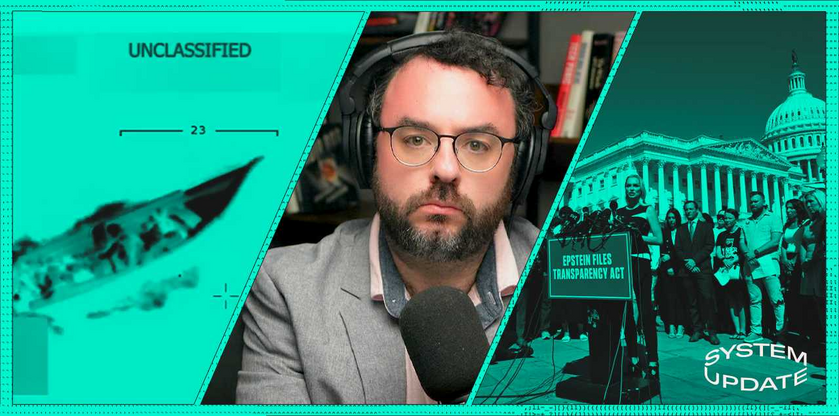Watch the full episode here:
https://rumble.com/v4fv9dt-system-update-show-234.htm
Good evening. It's Monday, February 26.
Tonight: Republican presidential candidate Nikki Haley suffered a deeply humiliating defeat over the weekend in her home state of South Carolina, the state where her political career was built when she served as its governor for six years. Despite massively outspending Donald Trump in that state—many millions in advertising for Haley to Trump's close-to-zero media buys—Haley was crushed by the former president by 20 points. Haley herself sought to create for herself an extremely low benchmark: to justify the continuation of my campaign, she said, she has to do at least better than the 17-point crushing defeat she suffered at Trump's hands in New Hampshire, where Independents and Democrats were encouraged to vote in the GOP primary against Trump. And yet, in her own home state, she could not even meet that absurdly low self-created expectation, as all polls show her trailing now from anywhere between 25 to 50 points in the 15 different Super Tuesday states, which will have their primaries and caucuses on March 5.
Normally, when candidates depend almost entirely on large donors like Haley, the limitation on the campaign is that those donors stop fueling the campaign as soon as it is obvious that the campaign is futile. And some of that is happening in the network of the former Koch brothers. They announced yesterday, after Haley's crushing defeat, that they were suspending funding for her campaign. However, she has already collected so many millions of dollars from hedge funds, Wall Street tycoons and various arms of the U.S. National Security State that she remains awash in funding and a lot of people continue to express eagerness to fund her campaign, despite the chances being extremely low, close to zero, that she could win the nomination.
She and her funders understand, as well as anyone else, how badly she is losing, so why is she continuing, and why are they so willing to pour their money into a campaign that has almost no chance, basically no chance, of culminating in the Republican nomination? There are reasons why, and we will examine those.
Then: the U.S.-funded war in Ukraine is now more than two years old. From the start—from the very first week of the Biden administration's vow in February 2022 to arm and finance Ukraine—we have repeatedly asked the same question over and over: in what conceivable way is it in the interest of the United States, and especially the lives of American citizens, for the U.S. government to fund and arm a war all to determine who will rule various provinces in eastern Ukraine, a country that even Barack Obama, as recently as 2016, said was not a vital interest of the U.S. At least in theory, this should always be the first question asked of any proposed U.S. policy, namely, how will it benefit or secure or improve the lives of American citizens? There was never, and still, there is not any coherent answer to that question.
Over the weekend, however, we did receive a glimpse into one reason why U.S. elites in Washington might consider this war in Ukraine so necessary to them. According to The New York Times, the Central Intelligence Agency has been using Ukraine for more than a decade as a vital American base for gathering intelligence and spying on Russia.
It seems clear at this point, especially in an election year, that the New York Times would never publish what it refers to as “highly sensitive secrets” about the CIA or especially the war in Ukraine unless the CIA wanted that paper to tell us this, perhaps as a reason to convince various sectors of the American population that have come to doubt the wisdom of further financing the war, as to why they should do so. Oh, it's a crucial country for the CIA to spy on Russia. Yet it doesn't seem like any of this has helped, which is why there's this desperate propaganda now about Ukrainian soldiers on the front line desperately scrolling their phones to see if they're getting money. We will examine all of the implications of this revelation, but for the moment, no doubt, constantly and unfailingly really, the establishment wings of both parties and establishment liberalism in the allied states align so perfectly with the agenda and the ideology of the CIA. The CIA's primary cause has been this war in Ukraine, for reasons we're now starting to understand better. And that, too, is the top agenda item of the Democratic Party and the establishment of the Republican Party.
Then, finally, last week we covered a scandal embroiling one of the three leading left-liberal streamers, his name is Vouch. That's at least his online name. His scandal took place when he accidentally revealed his downloaded porn file that included animated images of child pornography. We weren't much interested in the substance of the scandal, but it arguably matters, since he's been organizing with leading Democrats in Washington sent to Congressman Ro Connor, and so, obviously, a child porn scandal affects the Democratic Party that way. But we left the tawdry details to others. We did, however, invite a young online leftist, Gavin Charles of The Vanguard to discuss how sick and mentally decadent is this world of political left liberal streamers. People who look like Hasan Piker and Destiny beyond Vouch spend literally 8 to 10 hours or even 12 hours every single day, streaming live consecutively online, just online, 10 to 12 hours a day, creating a whole community of people whose identity and purpose in life becomes entirely parasocial, namely, devotion to these online communities and especially to the leaders of these online communities who become extremely wealthy by serving as a sort of creepy father figure to their audience.
Just this week, Jason Piker, who got his start in political streaming as a result of working for his uncle, the founder of The Young Turks, Cenk Uygur, inspired a fair amount of rage, including on the left, by suggesting that his “job,” which is earning millions upon millions of dollars a year by sitting in front of a camera and talking about politics in his life with no boss telling him what to do, is somehow a job that's more difficult and burdensome, at least in some respects, than people who work at ordinary jobs involving low hourly wages and manual labor and levels and levels and layers of bosses.
Piker is a self-identified socialist, even a communist. So, the idea that a person who brands himself very lucratively as a left-wing radical, earns many millions of dollars a year and lives in a gigantic mansion in LA and flies on a private jet and so obviously eagerly lives the lavish life of an online celebrity that he would of all people suggest that his job is harder, at least in some respects, than, say, plumbers or fast food workers, generated a lot of resentment—obviously. But on some certain level, I have to say, I think Hassan Piker was right when he described what he does as “soul destroying.” All kinds of data continue to show in a very convincing and yet alarming way that both the millennial and the Gen Z generations are plagued with a kind of mental illness and spiritual sickness at a rate far higher than any previous generation, and their complete dependency on online identities, when used as a replacement for real-life purpose and connection, is, according to the data, clearly a major reason for this mental and spiritual sickness.
So, in some respects, Piker's plea for help that streaming 10 hours or 12 hours a day for a parasocial audience on whom you depend for your happiness destroys your soul is precisely the point we were trying to raise last week when covering the other scandal rocking this world of liberal online streamers. And that's because online addiction is corrosive in so many ways and left-liberal political streaming communities, which are increasingly where a lot of people go to get their politics, but not just their politics, but their sense of purpose and identity in life, are the ultimate expression of this sort of sickness. So, we'll look at this latest episode, from that perspective, which I think merits a lot more attention than it gets.
For now, welcome to a new episode of System Update, starting right now.

















